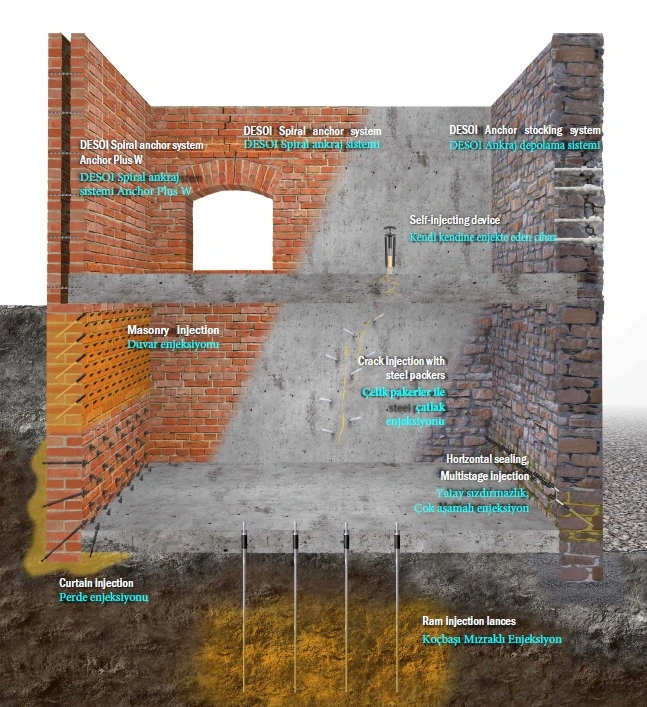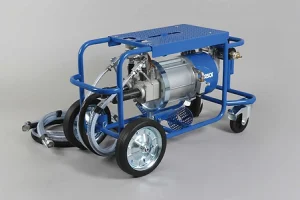Inpulex W R
Inpulex W R Single Component Polyurethane Resin It is a one-component polyurethane resin that reacts with water and can
Get time and price advantage with our one and two-component, state-of-the-art polyurethane, silicate and phenol injection chemical products, which are used for insulation, reinforcement, waterproofing and joining in tunnels and underground floors according to your needs.
Inpulex W R Single Component Polyurethane Resin It is a one-component polyurethane resin that reacts with water and can
Inpulex H Plus Two Component Polyurethane Injection Resin It is a slow reacting, highly flexible two component polyurethane resin. Inpulex
Inpulex NH/CH/ECH Two Component Injection Resin It is a two-component injection resin that reacts very quickly, for sealing and solidification
Inpulex W Single Component Polyurethane Injection Resin It is a one-component resin that reacts with water. It does not
Insilex Foam Silicate Based Injection Filler Foam It is a two component silicate injection resin that reacts quickly and expands
Insilex Black Two Component Non-Expanding Silicate Resin It is a fast-reacting, non-expanding two-component silicate resin with solid bonding with high
Insilex TS Silicate Based Resin It is a fast-acting, non-expanding two-component silicate injection resin.It can be used in wide cracks
Insilex Thix Instant thickening, fast curing two component silicate resin for high strength bonding of anchors. Hızlı tepkiyen ve anında
Inpulex 402 Single-Component Polyurethane Injection Resin It is a one-component polyurethane-based injection resin that reacts quickly, produced to stop water

Unlike conventional insulation systems, it perfectly prevents the contact of water and concrete. Chemical Injection System Application; It is the process of injecting structural liquid materials into the cracks in the concrete or rock floor with the help of an injection pump (providing the necessary injection pressure) and packer.
This application system, especially as an important part of the civil engineering field; It is widely used for ground consolidation and filling, sealing and filling in a wide variety of areas such as subway constructions, tunnel constructions, highways, dams, pools and parking lots. The issue of eliminating water leaks, which is frequently encountered in underground structures, tunnels, elevator shafts, power plant rooms, garages, parking lots, reservoir tanks, can only be eliminated with the Polyurethane Injection method.
The material similar to the fluidity of water is injected into the concrete with a pressurized machine. The material seeps into the cracks and spaces in the concrete where water enters, compresses under pressure and freezes within seconds. After the material is cured, it prevents water penetration into the concrete since it does not deteriorate or dissolve with any external intervention. It saves the concrete and the iron reinforcement inside from the negative effects of water. (We recommend you to review our OneShot Macro Synthetic Fiber Reinforcement product, which is used instead of steel mesh and steel wire reinforcement.)

These are the processes applied for the purposes of filling the gaps between the rocks, providing temporary support and creating a solid ground, especially in environments such as underground mines and tunnels. With this technique, in underground environments, whether rock or soil, the gaps and cracks between them are sealed and durable.
One of the most important features of Chemical Injection systems is that they can enter into a chemical reaction with water in the ground and turn into a rock-hard form depending on the purpose of use. Moreover, they gain a durability that can maintain the strength of the ground even against high energy seismic movements such as earthquakes and protect the structure. There are also products that can react and foam in environments where water is not available. Single-component, two-component or even three-component products are available. These components are used to change the curing rate of the product or to initiate its reaction. They have the ability to stop the flow in a short time, even in environments with high water pressure.
To summarize some of the features of Injection Chemicals:
Chemical Injection Systems have a wide range of applications. Especially with the developments in the chemical industry, application technologies have gained many innovations. Injection systems also take their share from these developments in every sense.
As FMY Chemistry; Our team of engineers, who are experts in their field and have hundreds of successful application experiences, make chemical injection applications with our products that have proven their quality. So how is the injection process done?
Copyright 2023 ©